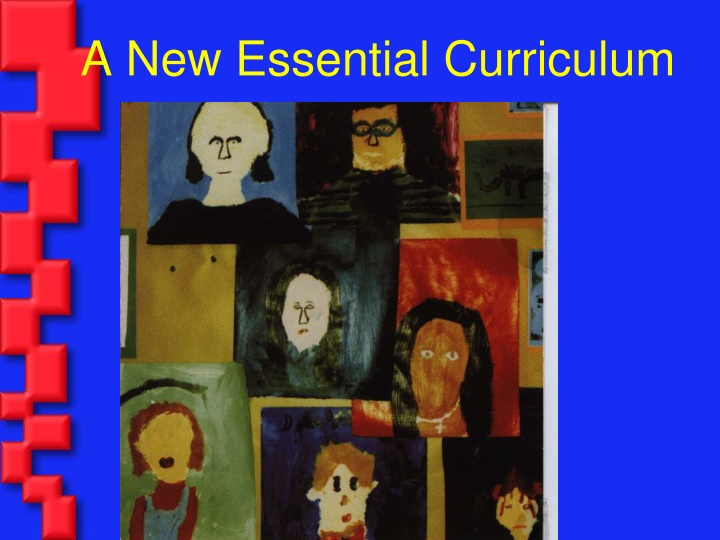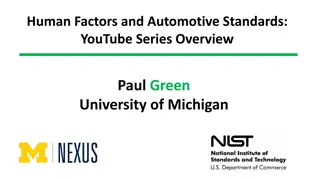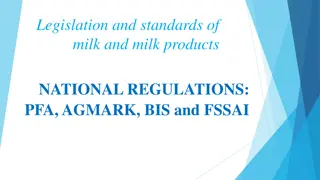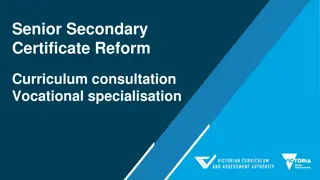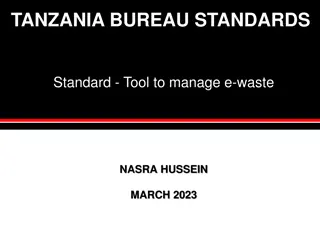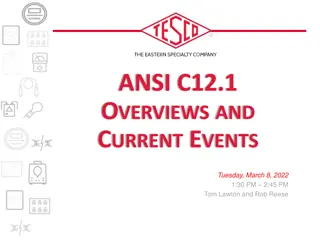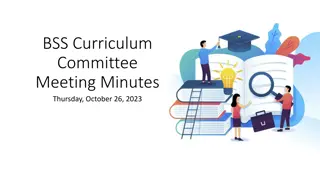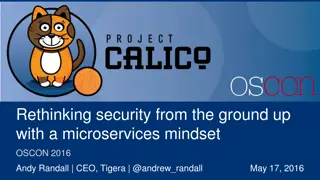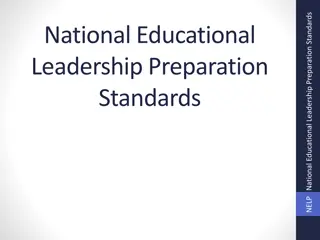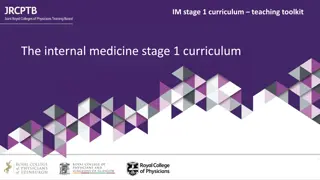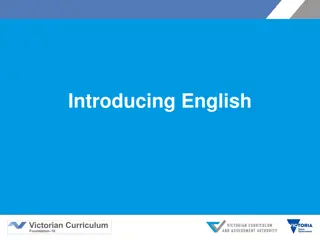Rethinking Educational Standards in Today's Curriculum
Rethinking standards in education to meet the evolving needs of learners. Addressing the discrepancy between state standards and global realities, emphasizing core essentials, and reevaluating the operational curriculum to support critical learning objectives.
Download Presentation

Please find below an Image/Link to download the presentation.
The content on the website is provided AS IS for your information and personal use only. It may not be sold, licensed, or shared on other websites without obtaining consent from the author.If you encounter any issues during the download, it is possible that the publisher has removed the file from their server.
You are allowed to download the files provided on this website for personal or commercial use, subject to the condition that they are used lawfully. All files are the property of their respective owners.
The content on the website is provided AS IS for your information and personal use only. It may not be sold, licensed, or shared on other websites without obtaining consent from the author.
E N D
Presentation Transcript
Essential questions: What is essential for our learners now? What revisions should be made in the present curriculum in light of new global realities? How might state standards be reconsidered to support our students? What are new essential conditions to support our work?
Rethinking standards: worthwhile targets for learning Standards vary between states Minimal attention to global realities Confusion between state tests and standards Pressures for testing are pulling us away from curriculum Cursory attention to contemporary issues Focus on literacy should be cross-disciplinary Many standards do not progress developmentally with any significance.
Essential = from the Latin esse; meaning to be; to distill to the core
How many standards are there? Average 200 broad standards; 3093 benchmarks Feasibility given # of days/hours/minutes Feasibility of operational days 15,465 hours necessary 13,104 hours available (optimum) Necessary to lengthen to grades 21-22 prior to college Increase time or decrease standards Source: (Marzano and Kendall;MACREL, Awash in a Sea of Standards ,1999)
The operational curriculum should support vital and critical standards.
Curriculum design requires us to make choices about what is essential now to help our learners for their future.
Update English Language Arts Expansive genre studies K-12 Classics and new voices Studying screenplays and teleplays Poetry SLAMS Memorization of classic work Critiques of electronic media
Expansion of Literacy: Media Criticism/ Media Invasion/Media Making TV critiques pre K-grade 3 Unit: Effects of TV on Me Formal media criticism begins grade 4 Television/film writing and production Documentary studies/ NPR models Web based national/international anthologies of children s stories and observations (RTW) Teaching students to conduct video conferences: Current Communications Benchmark
Teaching English as if it were a foreign language Foreign language teachers: emphasize constant spoken language exercises. emphasize consistent and correct use of grammar in writing and in speech. constantly assess listening. immerse students in practice scenarios. emphasize self-assessment for independent competence. work on phonemic awareness coupled with text interaction as a necessity.
Grades 4-12 : Every teacher is a language teacher reading reading writing writing speaking speaking listening listening Upgrading language skills Across all curriculum areas Interdependence of the four language skills Upgrading notebooks as assessments
Speaking and listening: skills formally assessed On-going interaction via video conferencing/or telephone with students abroad; On-going interaction with students in other parts of the U.S. Issue based forums regularly planned for grades 4-12.
Rethinking Mathematics Eliminating snapshot mathematics in pre-K through grade 3; Language arts daily speech and writing activity describing procedures and concepts; Corresponding time for students in middle school to balance those who accelerate; Summer Math programs in conjunction with colleges and universities for separate genders; FOCUS on translation strategies; post-its on math pages; Self-tutorials using computers for homework and practice
Revising and upgrading skills in the curriculum Planting lifelong capacity: Language Literacy Social Literacy Global Literacy Cultural Literacy
K-2 Sculptures Models Observation notes Captions Story boards Joke-telling Murals Diorama Graphs Charts Checklists Symbol systems Speech to persuade
Grades 3-5 artifact analysis comparative observation play performance newspaper articles math matrix design extended research reports note cards interview: questions short stories photo essay+text
Grades 6-8 the essay, the essay, the essay.... hypothesis testing and telling issue based forums blueprints models museum text/captions four note taking forms organizational templates original playwriting simulations
Grades 9-10 and 11-12 film criticism policy statements literary criticism professional journals senior defense &project workstudy analysis position papers legal briefs business plans anthologies choreography game & strategy books
Essential questions: What revisions should be made in the present curriculum in light of new global realities? How might state standards be reconsidered to support our students? What are developmental considerations for curriculum revision?
ACCESS Power Standards Reading, Writing, Listening & Speaking Leverage Endurance Success in School LESS
ACCESS Power Standards What we agree to micro manage Frequent opportunities to learn Frequent assessment Report and analyze data
Unpacking a Standard Objectives Understand a process for developing quality assessments in a standards-based system Identify four types of achievement targets within a standard Review several major types of assessment Match targets to most appropriate methods of assessment Consider best uses for this process in a standards-based setting
Unpacking a Standard Where we are heading Understand how breaking down ( unpacking ) a standard to relevant classroom targets can lead to the development or selection of appropriate assessments and instruction.
Defining Classroom Achievement Targets Targets are specific to focus learning Targets center on what is truly important so that assessment and instruction will be efficient Targets guide selection of appropriate types of assessment
Types of Targets Knowledge and Understanding- mastery of subject matter content, understanding where knowledge is applied. Reasoning- the ability to use the knowledge and understanding to figure things out and solve problems.
Types of Targets Performance Skills- the development of proficiency in doing something where it is the process that is important (playing a musical instrument, reading aloud, speaking a second language) Products- the ability to create tangible products (science fair projects, term papers)
Preparing to Take a Trip! Knowledge and understanding- Need to know functions of pedals, steering wheel, gauges; meanings of lines on map; # s on maps and roads. Reasoning- Able to calculate the time, with average speed, traffic conditions; # of stops. Performance Skills- Actual applying of knowledge & reasoning to operating the car, staying on the right roads, and progressing as planned. Product- Successfully completed trip. Disposition- Did I enjoy the trip.
Practice Unpacking Considering the completion of your income tax returns: what must you know and understand to do this task? What kinds of reasoning might be brought to bear to do this task? What performance skills will be needed to complete the product? What s the product? Completed, legal return.
Filing Those Taxes! Knowledge and understanding- Your income. Dates. Appropriate forms. Tax rate(s). Legal and not! Tax person s phone #. Components of process: types of taxes, fed, st., local. Where/how to get information. Reasoning-Selecting right forms (problem- solving). Deciding to itemize or not. Projection to complete project. Det. Needed resources. Knowing consequences of failing to file. Performance Skills- Ability to procure proper forms. Balancing income with withholding before filing. Reading & math. Using TurboTax! Product- Complete, legal term. Big refund. No audits. Check for payment.
Types of Assessment Selected Response traditional multiple choice, true/false, matching, short answer fill-in. Essays Assessment creation of brief, original written responses. Performance Assessment activities that require the demonstration of mastery of performance skills or ability to create products. Personal Communication asking questions and listening to answers to evaluate achievement.
Standard Content Skills Big Ideas Essential Questions Performance Selected response Essays Personal communication Evidence of Learning (Assessment) Knowledge and Skills Reasoning Performance Product Disposition Targets: Sequence of Learning Activities
